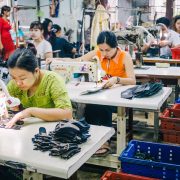One of the wonders of the free market is the role it plays in alleviating poverty around the globe. Recently, I had the pleasure of reading economist Ben Powell’s book, Out of Poverty, which explains the role sweatshops play in helping third world countries enter the global economy.
While reading the book, I began to wonder how proponents of the free market could best convey our arguments to those who do not understand the role these factories and plants play in helping to bring others out of poverty.
As a result, I compiled a list of common concerns shared by many anti-sweatshop activists. Using Powell’s text, I provide answers that address these concerns and help others understand how these sweatshops are helping those in developing countries.
Sweatshops abuse human rights are inherently evil and we should do everything we can to shut them down.
For those of us living in prosperous, fully-developed countries, it is easy to condemn the use of sweatshops in the developing world. In America, we are so fortunate to enjoy some of the best working conditions in the entire world. So, when we get a glimpse of working conditions in places like Bangladesh, we are understandably concerned.
However, the fact of the matter is that what we refer to as sweatshops are actually helping to bring developing countries out of poverty and into the global economy. And when we actively call for boycotts or for the shutdown of these factories, we actually harm these workers and stall economic development. To demand that these factories shut down would also mean trapping these nations in perpetual poverty.
In order for these nations to raise their own standards of living, they must be free to compete in the global economy. These factory jobs are integral in making this happen.
Okay, I understand that these jobs are important and it’s great that the economies of these countries are growing, but shouldn’t governments at least institute minimum wage laws to ensure that employers can’t take advantage of their employees?
Okay, I understand that these jobs are important, and it’s great that the economies of these countries are growing, but shouldn’t governments at least institute minimum wage laws to ensure that employers can’t take advantage of their employees?
To understand the economics of wage determination in sweatshops, we need to understand how wages are determined to begin with. As economist Ben Powell says in his book, Out of Poverty:
“Wages and working conditions in sweatshops are set by the same process that sets wages and working conditions in wealthier countries: supply and demand. The wages are conditions are determined by bidding between employers and potential employees. Employers can often make the offer, but potential employees are free to accept the offer or reject it. If employees cannot attract enough workers at thh wage they are offering, they will need to raise the wage to convince more workers to choose to work for them.”
As it stands currently, these factory jobs are actually some of the most sought after in the developing world, which means that these employers are not having a hard time finding people to voluntarily agree to come work at the factories. And since these wages are voluntarily agreed upon, it would be unjust for wealthy Americans to intervene and mandate higher wages.
Plus, we already know what happens when minimum wages are legislated, both from theory and from repeated historical experience: unemployment rises. An employer can’t afford to pay a worker more than the revenue his work brings in: doing so will eventually lead to bankruptcy. If employers can only offer a wage higher than that, they will have no choice than to lay workers off or not hire them in the first place. And it is precisely the workers who need the money the most who will find it harder to get work thanks to the minimum wage.
But a couple of dollars an hours is absurdly low!
To an American, sure. But you cannot compare the economy of developing nations to that of the United States. We have a standard of living in this country that far surpasses that of anywhere else in the world. Holding a nation like Bangladesh to the same standards as are our own country is entirely unrealistic. Especially when we compare the wages paid in sweatshops to those in other sectors in the developing world.
In most of these countries, a majority of the workers earn less than $2.00 per day. However, according to Powell’s research, “Out of the eighty-three specific sweatshop jobs for which we could calculate earnings, seventy-seven resulted in workers earning more than $2.00 per day.”
When we compare the average wage paid in these factories, as opposed to other sectors, we find that it is actually well above the national average. These jobs are always filled because they offer the workers opportunity to earn more money than in other sectors and learn new skills. Many of these workers came from rural farms. But factory work has given them the opportunity to leave the farm, learn new skills, and have the ability to break the cycle of poverty that their families have endured for generations. Many of these workers even go on to start their own factories because of the education they receive while working in factories.
But none of this makes up for the fact that the working conditions are so horrible. This type of environment would never stand in America.
We should always strive to foster a culture with the best possible work environment, but holding factories in the third world to American standards is not a realistic goal. Also, if conditions were to be improved, that money would come at the expense of the worker.
Powell says:
“Activists naively assume that demanding better working conditions will improve the lives of workers. Unfortunately, they are wrong. Improving working conditions raises firms’ costs of hiring labor.”
He continues:
“A firm can respond to demands for improved working conditions in three ways. First, just as when higher wages are mandates, the firm can cut back on the number of workers it employs, which throws some workers into worse alternatives. Second, depending on the particular demands, the firm may improve some working conditions, while making other conditions worse. For example, when confronted with demands for increased safety, the firm may compensate by requiring longer hours. Third, when working conditions improve, the firm can lower the wage necessary to attract employees.”
But since each of these is dependent on employee preference, no firm or factory will be able to please all workers 100 percent of the time.
What about the rumors that workers are jumping off buildings?
Any loss of human life is dreadful. But when we discuss suicide rates in third-world sweatshops we have to stop comparing the numbers to that in the U.S. In 2010, it was revealed that 18 employees had attempted suicide at the Foxconn plant in China. Almost instantly, Americans were outraged, pointing to the suicide rates as reasons to protest these sweatshops.
Tim Worstall addresses this issues, stating:
“The first is the spate of suicides at the Foxconn plants. Suicides did indeed take place and each and every one an individual tragedy. Both for those who died and for those they left behind to mourn them. However, we are talking about some 18 suicides in 2010. What we actually want to know is whether that is a high or a low number. Suicide does happen in every society and country, so before we start blaming working conditions we’d like to know whether that rate is higher or lower than that in the surrounding society.
The general suicide rate in China is 22 per 100,000 people. That is a high rate by international standards but that is the one that we should be looking at to try and judge the suicide rate at Foxconn.
Foxconn employs some 1 million people in total so, if the Foxconn workforce were to have the same suicide rate as the general Chinese population (which, to be accurate, it won’t for suicide is not equally divided over age groups and the workforce is predominantly young) we would expect to see 220 suicides among such a number each year.”
When we look at sweatshops, and all the concerns that arise from their very mention, we need to ask the question, “compared to what?” Comparing numbers of third-world countries to those in America is not an accurate assessment.
It is one thing to accept an adult’s right to choose where he or she works, but what about child labor? Employing children is immoral and we should definitely ask governments to outlaw this practice.
It is absolutely heartbreaking that some nations are so impoverished, children must work long hours in factories. However, having to work is a necessity. And if these factories did not exist, many of these children would be forced to take jobs that put them in more danger than sweatshops.
Powell writes:
“In 1993, U.S. Senator Tom Harkin introduced the Child Labor Deterrence Act, which would have banned imports from countries employing children. In response, Bangladeshi garment companies fired approximately 50,000 children that fall.”
But unfortunately for the labor activists supporting these efforts, just because a child is let go from a factory does not mean they will then automatically enroll in school. Children who work in the developing world work because they must; their circumstances require it. Without access to these jobs, children will be forced into other sectors.
Even economist Paul Krugman agrees that regulations will not help:
“The direct result was that Bangladeshi textile factories stopped employing children. But did the children go back to school? Did they return to happy homes? Not according to Oxfam, which found that the displaced child workers ended up in even worse jobs, or on the streets—and that a significant number were forced into prostitution.”
Again, when we are looking at the issue of sweatshops, instead of automatically calling for their demise, we need to ask ourselves if the workers of these factories would be better off without these jobs. And if we wish for those in developing countries to be elevated out of poverty, the answer is a resounding no, banning sweatshops would not benefit workers. It would, however, perpetuate the cycle of poverty.












